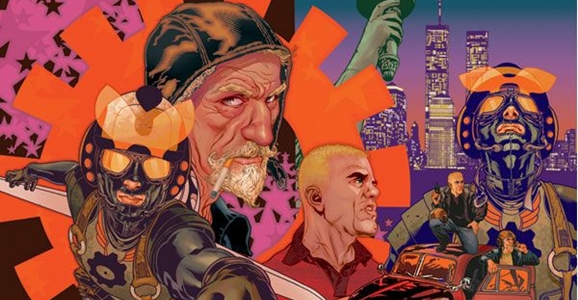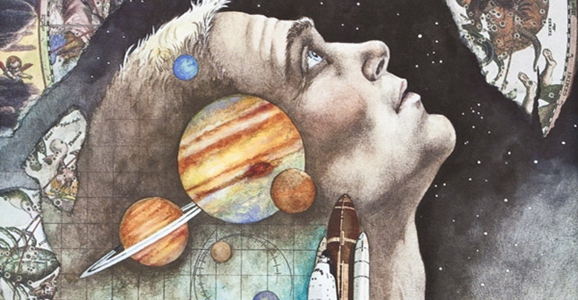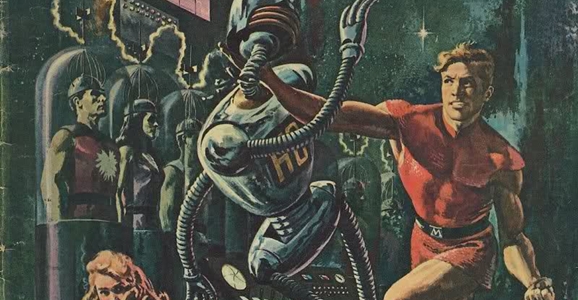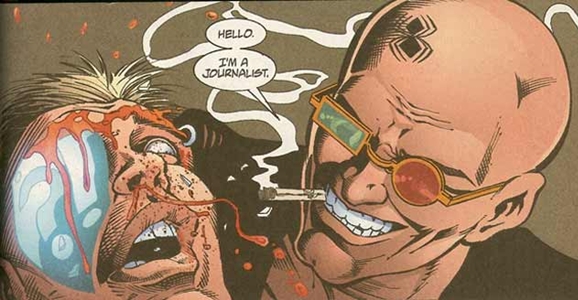Club Dredd: Five Science Fiction Comics That Should Follow In Judge Dredd’s Footsteps
If Judge Dredd can get made twice, these deserve to get made at least once.
When you think about it, it’s kind of amazing that the Judge Dredd comics got a big-screen adaptation in the first place, much less the remake that hits theaters today. While Dredd is fairly well known among comic fans, he’s certainly not a top-tier character like Superman or Spider-Man, and I think it’s a safe bet that most of the movie-going public doesn’t have a clue that Dredd is based on anything other than the godawful Stallone version. But if a series like Dredd can get made into a movie, not once but twice, then what other lesser-known science fiction comics out there have what it takes to become a kick-ass movie or TV show?
After wracking our brains for several days, we’ve compiled a list of science fiction comic properties just begging to make the leap from page to screen. Some are instantly recognizable to comics fans, and some are pretty obscure. If we were studio executives tasked with finding the next Dredd, here’s whose doors we’d be knocking on.

Ex Machina
Of all the items on this list, Ex Machina probably has the best chance of getting made. Brian K. Vaughan is a known quantity in Hollywood, having worked on Lost, and several of his properties have been auctioned in the past, including this one. Unfortunately it’s been a long time since there was any news about the movie, so we can probably assume it’s lodged firmly in development hell. That’s actually a good thing in some ways, because I don’t think you could do justice to Vaughan’s political/superhero mash-up with a two-hour movie.
Ex Machina is the story of Mitchell Hundred, a New York civil engineer who is gravely injured by a mysterious device he finds beneath the Brooklyn Bridge. He discovers he can now “talk” to machines — he can tell your cell phone to shut off, force a gun to jam before it fires, and even, in one unforgettable moment, order a passenger jet to land before it slams into the second World Trade Center tower on September 11, 2001. That latter feat is the proudest moment of his short-lived career spent flying around on a jetpack and fighting crime as “The Great Machine.”
But Ex Machina isn’t the story of his superhero career, or at least not primarily. Instead it focuses on what happens after he retires the jetpack…and becomes the mayor of New York City. The series plays out sort of like The West Wing if President Bartlett had a super-power he was legally forbidden to use while in office (a rule Hundred breaks pretty regularly). It’s a tribute to Vaughan’s writing that the political stuff is just as engaging as Hundred’s ongoing quest to understand and learn the origins of his powers.
Ideal Adaptation: An ongoing series for HBO or AMC. Both are comfortable taking chances with genre shows (HBO with True Blood, AMC with The Walking Dead), and both have a reputation for smart programming.

Orbiter
We spend a lot of time here on GFR bemoaning the fact that we as a country have lost the passion and drive to push forward into space. Now private companies such as Virgin Galactic and SpaceX are stepping forward to carry that torch that NASA lit, but it’s still not quite the same. There was a time when every little kid dreamed of being an astronaut, and Warren Ellis’ Orbiter is very much about our dreams of space, and what happens when an outside force strives to rekindle them.
Orbiter opens in a world much like ours, but where the Space Shuttle program was shut down a decade before, in the aftermath of Space Shuttle Venture mysteriously vanishing during a routine mission. Then one day, without warning, the Venture reappears, burning through the atmosphere and crashing near Kennedy Space Center. There is only one survivor aboard, and that’s not the weirdest part. The Venture is now covered by some sort of unidentifiable “skin.” The main engine has been replaced with fantastic alien technology. And there is sand from Mars in the Venture‘s landing gear.
From that amazing hook, Orbiter focuses on three experts brought to try and determine what happened to the craft — and its sole remaining crew member — during its 10-year absence. Without spoiling all the secrets, Orbiter is an addictive science fiction mystery, as well as a love letter to space exploration and to our fundamental human need to keep pushing forward into the unknown.
Ideal Adaptation: A movie. Originally published as a graphic novel by writer Warren Ellis and artist Colleen Doran, Orbiter has a tight, self-contained story, the perfect foundation for a movie. The trick is that, while the mystery of Venture‘s missing decade is compelling and fascinating, it’s not exactly action packed. It would have to find a filmmaker that wants to truly adapt the soul and spirit of the story, as opposed to throwing the book out and making some sort of hare-brained alien-invasion story or whatever. Rian Johnson, I’m looking at you…

Magnus, Robot Fighter
I spent many hours of my childhood sitting around reading my dad’s old comics, and one of my favorite series was Magnus, Robot Fighter, originally created by writer/artist Russ Manning back in 1963. The character has been resurrected several times over the decades, but the core concept remains the same: he’s a badass martial artist who can karate chop the heads off of robots. Manning envisioned the character as a sort of reverse Tarzan, with young Magnus raised by a robot named 1A and taught to fight against rogue robots that are threatening complacent humanity back in the “civilized world.”
Set in the year 4000 A.D., mankind has become lazy and totally dependent on their robotic servants. 1A can see disaster looming on the horizon, so he trains young Magnus to help prevent a full-blown robopocalypse. This involves him becoming so skilled at martial arts that he can actually break steel with his bare hands. After his training, 1A equips Magnus with a device that lets him hear robotic communications and sends him back to North Am, a vast, multi-leveled cityscape that stretches all the way across the North American continent. There he fights robots, aliens, and the occasional dastardly human.
The original Magnus comics are definitely a product of their time, but the core concept of a human trained to fight robots with his bare hands is still great fodder for a movie. And if the idea of a guy punching through steel is too much to ask an audience to buy into, there are tons of science fiction remedies you could add to make the story feel more plausible. Hell, having 1A equip Magnus with a few robotic parts to help him take down other robots would have a nice bit of thematic duality.
Ideal Adaptation: This one doesn’t really have the legs for a TV series (aside from the ones on Magnus’ girlfriend, Leeja), but a movie could be great. It’s not a widely known property, so that would give filmmakers more flexibility when it comes to making it work on the big screen. (I’m not in favor of changing things just to change them, but a 1-to-1 transfer of the original comics to screen would be pretty corny.)

Transmetropolitan
It’s no coincidence that this list contains two items written by Warren Ellis. Aside from being one of the best comics writers working today, he’s also been responsible for some of the best science fiction comics of all time. I could easily have swapped this entry out for Planetary or Global Frequency or Ignition City. But of all of them, the one I would most love to see adapted is his twisted, brilliant, filthy, truth-saying, hilarious, heartbreaking masterpiece that is Transmetropolitan.
At the core of Transmet is Spider Jerusalem, a semi-insane journalist who’s like the discarded bastard child of Hunter S. Thompson, Harlan Ellison, and Bugs Bunny, a leering agent of chaos armed with a bowel disruptor…which does exactly what it sounds like it does. As the series opens, he’s living a quiet life in the country, drinking himself to death after his fame reached unmanageable levels back in the city. He’s convinced (blackmailed) by his editor into returning to both the monolithic, unnamed City and the journalist beat. He then proceeds to ruin the lives of two separate presidents, several “filthy assistants,” and, in the end, himself.
Along the way, Spider becomes our tour guide through the City, exposing the malignant corruption and hypocrisy eating away at its guts. Meanwhile, the masses are kept stupid and drugged and distracted so the powerful can use their lives like toilet paper. Despite being set in the future, Spider’s holy crusade is all too timely in our era of ever-more-divisive politics and the celebration of ignorance. Through Spider’s voice, Ellis screams from a mountaintop to look around and save ourselves before it’s too late. And he does it all while taking us on an unforgettable journey through mind-bending science fiction concepts and darker-than-dark humor.
Ideal Adaptation: An ongoing TV series on Starz. It doesn’t seem like a good fit for HBO, and while FX loves antiheroic characters, its content restrictions are too limiting to really let a Transmetropolitan series let loose. The appeal of Transmet isn’t just the vulgarity and squirm-inducing details, but they are a crucial part of the feel of Spider’s world. With Spartacus, Starz has proven it has no qualms whatsoever about pushing the limits, and that’s something a Transmet series should constantly be doing.

Buck Godot
I’ve written about my love of Phil Foglio’s Buck Godot before, and I would love to see it adapted for film or TV. Buckminster “Buck” Godot is a Hoffmanite, a human offshoot race adapted for life in high-gravity environment. Since this makes him a lot sturdier than your garden-variety human, he makes a living as a mercenary and “zap gun for hire.” While his size helps, he’s also quick-witted and clever, and over the course of several comics and graphic novels, Buck outsmarts a mysterious teleporter, survives ongoing assassination attempts by inebriated clones, and earns the respect of Lord Thezmothete, the most advanced being in the galaxy.
Buck Godot is one of my favorite comic runs of all time. The universe Foglio created for Buck and company to inhabit is surprisingly well thought out and detailed for a setting that hasn’t actually been used that much over the years. The longest Buck story, and the one that is ripe for adaptation, is the eight-issue “Gallimaufry” series. The Gallimaufry is an enormous space station where the governments of the galaxy convene to petition, negotiate, and undermine each other, all kept in check by Lord Thezmothete. Trouble breaks out when the various governments begin feuding over the disappearance of the Winslow, a small, fuzzy, amiable, lizard-like creature that is a major part of at least three quarters of the galaxy’s religions. (The fourteenth Accepted Sign of Divinity is “Be the Winslow.”)
All of Buck’s adventures are wonderful, but the Gallimaufry is perfectly primed for adaptation because it quickly introduces or reintroduces various elements of the world that readers need to know, then plunges Buck into a mystery story that is still, to this day, one of my favorite science fiction stories I’ve ever read. It’s probably too weird to become a mainstream box-office hit, but these days there are so many new media outlets that it shouldn’t be tough finding a home for Buck and company. And the best part? You can go read the entire run over at Foglio’s website for free.
Ideal Adaptation: A CGI ongoing or miniseries for Comedy Central’s Adult Swim. Aside from all the world-building and solid writing I praised above, the Buck Godot stories are also fall-down funny, so the material would fit right in. A CGI miniseries would be the perfect venue for an adaptation of the “Gallimaufry” story arc, while the other tales would work well broken into a few episodes. Hell, hire Foglio and have him write new Buck stories! Crucially important, however, is to maintain Foglio’s unmistakable art style. Without that it just wouldn’t feel like Buck Godot.











